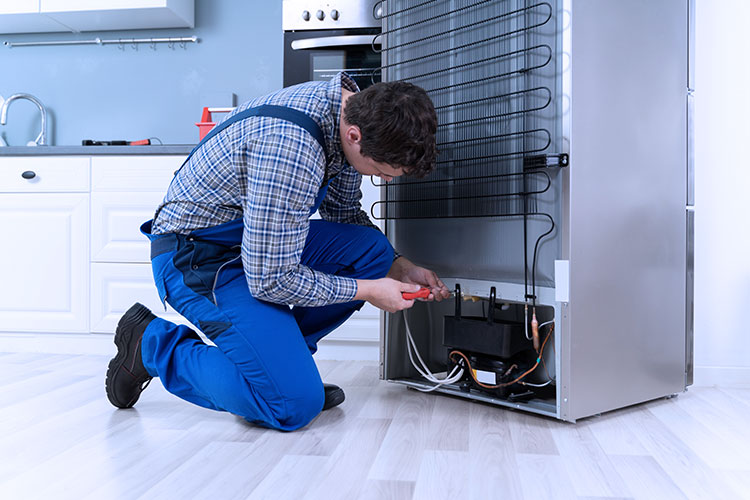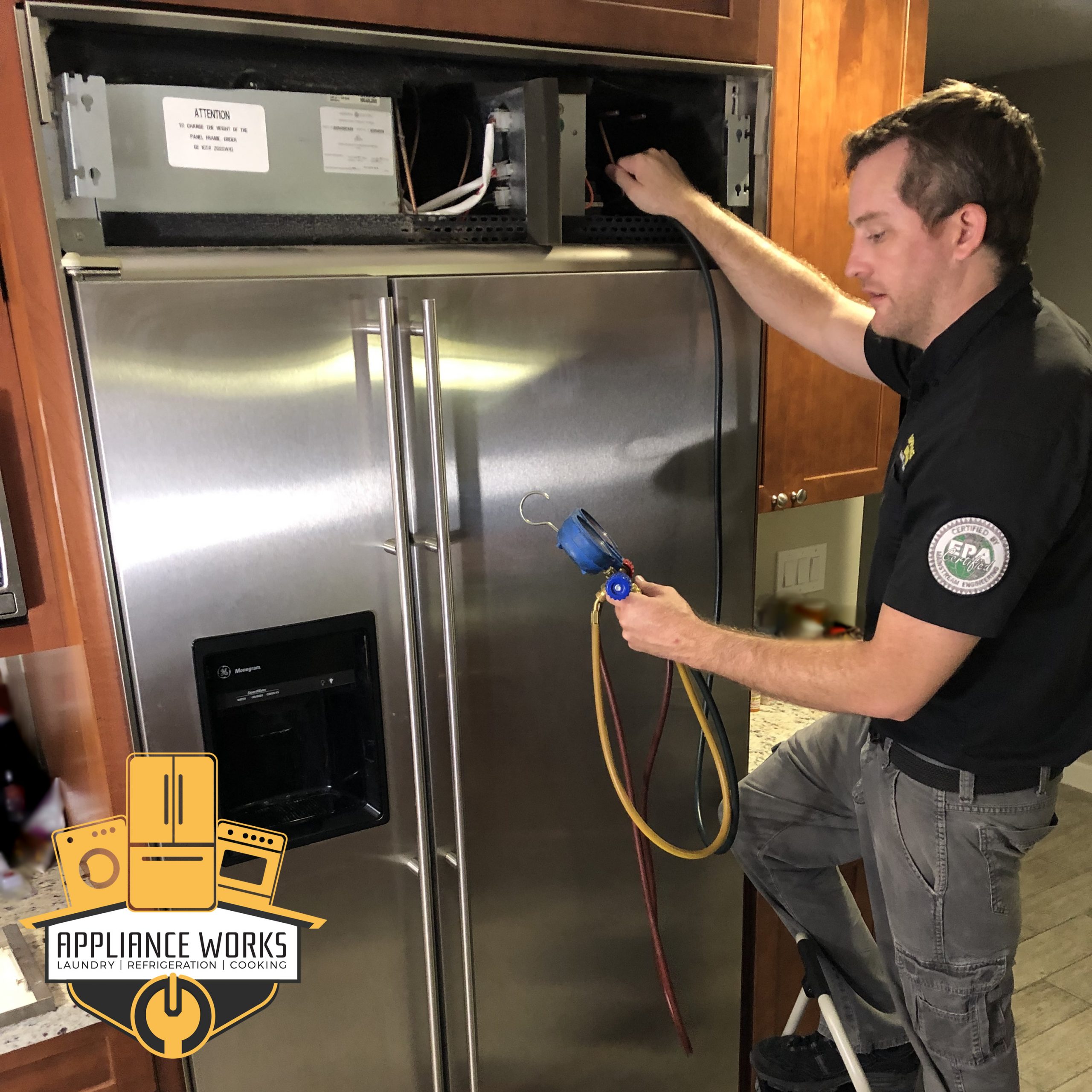The Ultimate Preventive Maintenance Guide by Dependable Refrigeration & Appliance Repair Refrigerator repair specialist of Oro Valley
The Ultimate Preventive Maintenance Guide by Dependable Refrigeration & Appliance Repair Refrigerator repair specialist of Oro Valley
Blog Article
Vital Tips for Effective Ref Repair to Extend Device Lifespan
When it comes to your fridge, appropriate repair service and upkeep are essential for long life. Recognizing usual problems and knowing when to act can make all the difference.
Understanding Usual Fridge Troubles
Fridges are crucial in maintaining your food fresh, yet they can run into a series of usual troubles that interrupt their performance. One frequent issue is inadequate air conditioning. If you see food spoiling quicker than common, examine the thermostat setups or think about if the door seals are damaged. Another common issue is extreme noise, which could show a malfunctioning compressor or a stopping working fan. You could likewise experience water pooling inside or underneath the refrigerator; this often arises from a stopped up defrost drainpipe or a defective water line. Additionally, if your fridge's light isn't functioning, it can be a simple bulb problem or an issue with the door switch. Ice accumulation in the freezer can prevent air flow and cooling down efficiency. Recognizing these concerns early can save you time and cash out of commission, guaranteeing your refrigerator runs efficiently and efficiently.
Routine Maintenance Practices
To maintain your devices running smoothly, you need to remain on top of regular upkeep practices. Clean the condenser coils, examine the door seals, and monitor the temperature level setups to guarantee peak efficiency. These straightforward jobs can save you money and time on repairs down the line.
Tidy Condenser Coils Regularly
Cleaning your condenser coils consistently can substantially enhance your appliance's efficiency. Dust and dirt accumulate on these coils in time, creating your device to work harder and consume even more energy. To keep them clean, unplug your appliance and carefully eliminate any kind of protective covers. Utilize a vacuum cleaner with a brush accessory or a soft brush to delicately get rid of particles. If needed, a combination of warm water and mild cleaning agent can help get rid of stubborn grime. See to it to let everything completely dry completely before reassembling and plugging the device back in. Aim to clean your coils at least two times a year, or regularly if you have animals or stay in a dusty atmosphere. This easy task can prolong the lifespan of your home appliance significantly.
Check Door Seals
Three basic steps can aid you guarantee your device's door seals are in good condition. Initially, check the seals on a regular basis for any splits, splits, or indicators of wear. These damages can cause air leakages, affecting effectiveness. 2nd, tidy the seals making use of warm, soapy water to eliminate any debris or grime. A tidy seal assures a limited fit and better efficiency. Ultimately, do a basic test by closing the door on a paper. If you can easily pull it out without resistance, the seal may need changing. By adhering to these steps, you'll maintain your home appliance's performance and longevity, conserving you money on energy expenses and fixings over time.
Monitor Temperature Setups
On a regular basis monitoring your home appliance's temperature level settings is important for best efficiency and efficiency. Whether you're handling a refrigerator, fridge freezer, or stove, watching on these settings can prevent numerous problems. For refrigerators, go for temperature levels between 35 ° F and 38 ° F; for fridges freezer, stay 0 ° F. If the temperature levels are too expensive or low, your home appliance may function harder, wasting power and reducing its lifespan. Utilize a thermostat to check these setups consistently, particularly after significant adjustments, like relocating your appliance or readjusting the thermostat. If you discover variations, readjust the settings accordingly and get in touch with the user manual for assistance. By remaining aggressive concerning temperature level tracking, you'll guarantee your devices run efficiently and last much longer.
Troubleshooting Cooling Problems
When your refrigerator isn't cooling properly, it can cause spoiled food and wasted money, so attending to the issue without delay is important. Beginning by inspecting the temperature settings to confirm they're at the advised degrees, generally around 37 ° F for the refrigerator and 0 ° F for the freezer. If the setups are right, check the door seals for any gaps or damage; a faulty seal can permit cozy air to go into.
Following, examine the vents inside the fridge and fridge freezer. Verify they're not blocked by food things, as this can interfere with air movement. Listen for the compressor; if it's not running or making uncommon sounds, it might need attention. Ultimately, examine the condenser coils, normally located at the back or base of the device. Dirt and debris can accumulate, triggering cooling down problems. Clean them with a vacuum cleaner or brush to optimize performance. If troubles linger, it could be time to call a specialist.
Fixing Water Leak and Ice Build-Up
If you're managing water leakage or ice accumulation in your home appliance, it's essential to identify the resource of the issue. By identifying where the water is coming from, you can protect against more issues and avoid expensive repair services. Let's check out some effective methods to tackle these typical problems.
Identify Leak Resources
Just how can you properly identify the sources of water leakage and ice accumulation in your devices? Beginning by examining the seals and gaskets on your refrigerator and fridge freezer doors. A worn or damaged seal can permit warm air to enter, causing condensation and ice. Next off, examine the drain visit this site frying pan and water drainage system for blockages or obstructions; a backed-up drainpipe can result in water pooling. Search for any kind of loosened links in the water system line, which can create leaks. Also, analyze the defrost drain for ice accumulation, which can interfere with appropriate water drainage. By methodically examining these locations, you'll pinpoint the resource of the problem, enabling you to take the essential actions to repair it and prolong your device's lifespan.
Avoid Ice Formation
To stop ice formation in your home appliances, beginning by confirming the temperature setups are suitable. If your refrigerator or fridge freezer is too cool, it can bring about extreme ice accumulation. Inspect the door seals routinely; harmed seals can let warm air in, causing condensation and ice formation.
Maintain the appliance well-ventilated and prevent overcrowding, as this can block air flow - Washing Machine Repair Dependable Refrigeration & Appliance Repair Service. Likewise, consistently thaw your freezer if it doesn't have an automatic defrost feature.
If you see water leak, determine and fix any kind of obstructed drainage openings, as they can contribute to ice buildup. Clean the coils and validate they're functioning properly to preserve peak efficiency. Taking these steps will help extend your device's lifespan and efficiency.
Addressing Noisy Refrigerator Sounds
While it could appear disconcerting, a noisy fridge often signals small issues rather than major malfunctions. Usual wrongdoers include the compressor, followers, and water lines.
Following, examine for loose items inside. Often, containers or shelves can rattle, developing undesirable sound. Tighten or rearrange them to remove the audios.
If you see a clicking noise, it could be the defrost timer. This is usually safe however can indicate it requires assessment.
Lastly, confirm your refrigerator is degree. An unbalanced appliance can generate resonances and sound. Make use of a level to check, and readjust the feet if required. Attending to these issues quickly can assist keep your fridge's efficiency and prolong its life-span.
When to Replace Components vs. Complete Substitute

Nevertheless, if your appliance is older and experiencing several concerns, a full substitute can be extra cost-effective. Think about the expense of repair work versus the device's value. If fixings surpass 50% of a new device's price, it's normally better to buy a replacement. Additionally, if you discover continuous issues that maintain repeating, it's an indicator that your device has reached the end of its life. Weigh these variables meticulously to make the most effective decision for your needs and budget plan.
Understanding When to Call a Specialist
Exactly how can you inform when it's time to employ a professional for home appliance fixing? If you see uncommon noises, scents, or leakages, it's a clear signal that something's incorrect. Do not neglect these indications; they typically show much deeper problems. If your appliance stops functioning completely or often journeys circuit breakers, it's an additional warning.
You must likewise consider your own convenience degree with repair work. If you're unsure concerning detecting the issue or lack the right tools, it's ideal to connect for assistance. Bear in mind, trying challenging repair work can lead to even more damage or even safety and security dangers.

Regularly Asked Inquiries
Just how Usually Should I Clean the Refrigerator Coils?
You must cleanse your refrigerator coils every 6 months. This aids keep effectiveness and prevents overheating. If you notice you can try this out too much dirt or pet dog hair, tidy them much more frequently to assure your fridge runs smoothly.

Can I Use Vinegar for Cleaning My Refrigerator?
Yes, you can make use of vinegar to cleanse your refrigerator! It's a superb natural cleaner that gets rid of smells and spots. Refrigerator repair experts Dependable Refrigeration & Appliance Repair. Just blend it with water, apply it to surfaces, and wipe down for a fresh, tidy refrigerator
What Temperature Should My Refrigerator Be Set To?
You need to establish your fridge to 37 ° F(3 ° C) for suitable food preservation. This temperature level keeps your food fresh while preventing wasting, ensuring your groceries last longer and minimizing waste. It's an easy change you can make!
Does a Refrigerator Need to Be Leveled?
Yes, your refrigerator needs to be leveled. If it's irregular, it can influence cooling down performance and cause excess noise. Inspect the leveling legs and readjust them to ensure proper balance for suitable efficiency.
How Can I Decrease Refrigerator Energy Intake?
To minimize your refrigerator's power intake, keep it clean and well-ventilated, inspect door seals for additional reading leakages, established the temperature level in between 35-38 ° F, and stay clear of overloading it. These actions can considerably reduce your power expenses.
Report this page